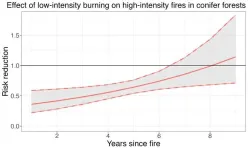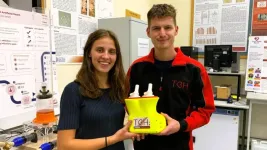(Press-News.org) With Amazon aiming to make 10,000 deliveries with drones in Europe this year and Walmart planning to expand its drone delivery services to an additional 60,000 homes this year in the states, companies are investing more research and development funding into drone delivery, But are consumers ready to accept this change as the new normal?
Northwestern University’s Mobility and Behavior Lab, led by Amanda Stathopoulos, an associate professor of civil and environmental engineering, wanted to know if consumers were ready for robots to replace delivery drivers, in the form of automated vehicles, drones and robots. The team found that societally, there’s work to do to shift public perceptions of the near-future technology.
“We need to think really carefully about the effect of these new technologies on people and communities, and to tune in to what they think about these changes,” Stathopoulos, the study’s senior author, said.
The study, titled “Robots at your doorstep: Acceptance of near-future technologies for automated parcel delivery,” published last week in the journal Scientific Reports. Researchers noted a “complex and multifaceted” relationship between behavior and acceptance of near-future technologies for automated parcel delivery.
While people were generally more willing to accept an automated vehicle as a substitute for a delivery person — perhaps because there already is familiarity with self-driving cars — people disliked drones and robots as options. However, as delivery speed increased and price decreased, likelihood to accept the technology increased.
They also found that tech-savvy consumers were more accepting of the near-future technologies than populations less familiar with the technology.
Stathopoulos is the William Patterson Junior professor of civil and environmental engineering at Northwestern’s McCormick School of Engineering, where she studies the human aspects of new systems of mobility. She also is a faculty affiliate of Northwestern’s Transportation Center. She said especially after the pandemic, people have come to expect efficient delivery from e-commerce purchases as they increasingly work from home.
Maher Said, a graduate of Stathopoulos’s lab, is the study’s lead author.
“There’s a paradox: We're having a hard time reconciling the convenience and the benefit of getting speedy, efficient delivery with its consequences, like poor labor conditions in warehouses, air pollution and congested streets,” Stathopoulos said. “We don't really see that other role that we play as citizens or as users of the city. And one role is directly affecting the other role, and we are both. With automated delivery, we could reduce some of these issues.”
The team designed a survey to assess preferences of 692 U.S. respondents, asking questions about different delivery options and variables like delivery speed, package handling and general perceptions.
Stathopoulos said that while new modes of delivery present an exciting opportunity, societally, “we’re not there just yet.” As companies ramp up drone deliveries due in part to labor shortages and in part because existing systems cannot satisfy the sheer volume of e-commerce deliveries, the researchers caution that these innovations may fail because of a lack of public acceptance.
Stathopoulos said she thinks shipping and logistics centers should be placed at the “front and center” of city planning and design, as in some European cities, to recognize its importance and role in quality of life. Policy makers will also need to become part of the conversation as more drones enter the airspace and labor shifts. None of this will work, Stathopoulos argued, until companies begin to consolidate their unique systems.
“On the planning side, we need to make sure that we embrace the fact that the massive amount of deliveries is going to shape our cities,” Stathopoulos said. “Collaboration, coordination, and information sharing between companies has been a running challenge — but it’s not going to work if everyone has their own technology. It just destroys the purpose and builds redundant and overlapping systems.”
However, by listening to and conducting more frequent assessments of user acceptance of technologies, Stathopoulos argues that policy makers and companies can prepare for the future and work to overcome anxiety and reluctance to accept new technologies.
The study was supported by the National Science Foundation Career program.
END
Are consumers ready for robots to show up at their doorstep?
Study found consumers are more prepared for automated vehicle delivery than drones or robots
2023-11-10
ELSE PRESS RELEASES FROM THIS DATE:
Researchers adapt health system COVID-19 collaboration to track near-real-time trends in visits for substance use
2023-11-10
Minneapolis, Minn. – In a recently released study, researchers at Hennepin Healthcare and other Minnesota health systems describe how a COVID-19 collaboration across Minnesota health systems was adapted to monitor near-real-time trends in substance use–related hospital and emergency department (ED) visits.
The Minnesota Electronic Health Record Consortium (MNEHRC), developed in response to the COVID-19 pandemic, repurposed its surveillance methods to identify health disparities and inform equity-driven approaches to the overdose epidemic.
MNEHRC’s study, "Minnesota Data Sharing May Be Model for Near-Real-Time Tracking of Drug Overdose Hospital ...
RIT’s Carichino receives National Science Foundation LEAPS-MPS award
2023-11-10
Rochester Institute of Technology’s Lucia Carichino, assistant professor in the School of Mathematics and Statistics, has received a Launching Early-Career Academic Pathways in the Mathematical and Physical Sciences (LEAPS-MPS) award from the National Science Foundation (NSF).
The award funds Carichino’s research in computational modeling of the interaction between the eye and a contact lens. Specifically, Carichino is focusing on orthokeratology (ortho-k) lenses that help reduce myopic progression in kids and young adults. She aims to develop a mathematical model that will ...
A closer look at rebel T cells
2023-11-10
LA JOLLA, CA—Scientists at La Jolla Institute for Immunology (LJI) are investigating a talented type of T cell.
Most T cells only work in the person who made them. Your T cells fight threats by responding to molecular fragments that belong to a pathogen—but only when these molecules are bound with markers that come from your own tissues. Your influenza-fighting T cells can't help your neighbor, and vice versa.
"However, we all have T cells that do not obey these rules," says LJI Professor and President Emeritus Mitchell Kronenberg, Ph.D. "One of these cell types is mucosal-associated invariant ...
Low-intensity fires reduce wildfire risk by 60%, according to study by Columbia and Stanford researchers
2023-11-10
There is no longer any question of how to prevent high-intensity, often catastrophic, wildfires that have become increasingly frequent across the Western U.S., according to a new study by researchers at Stanford and Columbia universities. The analysis, published Nov. 10 in Science Advances, reveals that low-intensity burning, such as controlled or prescribed fires, managed wildfires, and tribal cultural burning, can dramatically reduce the risk of devastating fires for years at a time. The findings – some of the first to rigorously quantify the value of low-intensity fire – come while Congress is reassessing the U.S. Forest Service’s ...
Unlocking the secrets of spin with high-harmonic probes
2023-11-10
Deep within every piece of magnetic material, electrons dance to the invisible tune of quantum mechanics. Their spins, akin to tiny atomic tops, dictate the magnetic behavior of the material they inhabit. This microscopic ballet is the cornerstone of magnetic phenomena, and it's these spins that a team of JILA researchers—headed by JILA Fellows and University of Colorado Boulder professors Margaret Murnane and Henry Kapteyn—has learned to control with remarkable precision, potentially redefining the future of electronics and data storage.
In a new Science Advances ...
University of Minnesota Medical School researchers investigate cause of cardiomyopathy in coronary artery disease using cardiac MRI
2023-11-10
MINNEAPOLIS/ST. PAUL (11/10/2023) — Researchers from the University of Minnesota Medical School examining the cause of cardiomyopathy discovered one out of every six patients with coronary artery disease had non-ischemic or dual cardiomyopathy.
The findings of this study were published this week in the peer-reviewed journal Circulation, the flagship journal of the American Heart Association.
Cardiomyopathies are diseases of the heart muscle. Patients with coronary artery disease can have cardiomyopathy from heart muscle ...
Heart of Gold: Bath student team wins world Heart Hackathon competition
2023-11-10
Student engineers from the University of Bath are on top of the world after winning an international competition to design an artificial heart.
Team Bath Heart took top prize at the grand final of the first-ever Heart Hackathon, which was held in Texas at the end of October.
Six members of the team presented their device to global experts in artificial heart technologies, competing against teams from Australia, the United States, Sweden, New Zealand, Romania and Egypt.
The ‘total artificial heart’ ...
Cleveland Clinic research links sleep apnea to increased risk of atrial fibrillation
2023-11-10
New research from Cleveland Clinic has identified a link between sleep apnea and the development of atrial fibrillation, a common heart rhythm disorder.
Published in JAHA, the study of over 42,000 patients found that sleep-related hypoxia - or low oxygen levels during sleep - is associated with a higher risk of developing atrial fibrillation over time. The study found this risk persisted even after accounting for lung function, suggesting sleep-related hypoxia independently increases atrial fibrillation risk separate from any underlying lung disease.
Atrial fibrillation causes an irregular ...
New approach to pancreatic cancer treatment expands therapeutic possibilities, shows promise for increased survival
2023-11-10
Preclinical research published in the Journal for ImmunoTherapy of Cancer points to a promising new treatment option for people with pancreatic cancer. Researchers from VCU Massey Comprehensive Cancer Center and the VCU Institute of Molecular Medicine (VIMM) suggest that when used in a form that can be delivered directly into the tumor cell, polyinosine–polycytidylic acid (pIC) suppresses tumor growth, induces cancer cell death and enhances survival in animal models with the most common form of pancreatic cancer.
Researchers also concluded that when used alone ...
UTHealth Houston partners with Mexican organizations for $5 million NIH grant to improve implementation of cancer control interventions in Mexico and Latin America
2023-11-10
A five-year, $5 million grant has been awarded by the National Cancer Institute (NCI) to the UTHealth Houston Institute for Implementation Science to support research and training in implementation science, with a focus on improving cancer control efforts in Mexico and Latin America.
The grant brings together researchers from UTHealth Houston, the Mexican National Institute of Public Health (INSP), the Mexican National Cancer Institute (INCan), and the University of California San Francisco (UCSF).
The grant will fund a new center, LISTOS for Cancer Control – Leveraging Implementation ...
LAST 30 PRESS RELEASES:
Brain cells drive endurance gains after exercise
Same-day hospital discharge is safe in selected patients after TAVI
Why do people living at high altitudes have better glucose control? The answer was in plain sight
Red blood cells soak up sugar at high altitude, protecting against diabetes
A new electrolyte points to stronger, safer batteries
Environment: Atmospheric pollution directly linked to rocket re-entry
Targeted radiation therapy improves quality of life outcomes for patients with multiple brain metastases
Cardiovascular events in women with prior cervical high-grade squamous intraepithelial lesion
Transplantation and employment earnings in kidney transplant recipients
Brain organoids can be trained to solve a goal-directed task
Treatment can protect extremely premature babies from lung disease
Roberto Morandotti wins prestigious Max Born Award for pioneering research in quantum photonics
Scientists map brain's blood pressure control center
Acute coronary events registry provides insights into sex-specific differences
Bar-Ilan University and NVIDIA researchers improve AI’s ability to understand spatial instructions
New single-cell transcriptomic clock reveals intrinsic and systemic T cell aging in COVID-19 and HIV
Smaller fish and changing food webs – even where species numbers stay the same
Missed opportunity to protect pregnant women and newborns: Study shows low vaccination rates among expectant mothers in Norway against COVID-19 and influenza
Emotional memory region of aged brain is sensitive to processed foods
Neighborhood factors may lead to increased COPD-related emergency department visits, hospitalizations
Food insecurity impacts employees’ productivity
Prenatal infection increases risk of heavy drinking later in life
‘The munchies’ are real and could benefit those with no appetite
FAU researchers discover novel bacteria in Florida’s stranded pygmy sperm whales
DEGU debuts with better AI predictions and explanations
‘Giant superatoms’ unlock a new toolbox for quantum computers
Jeonbuk National University researchers explore metal oxide electrodes as a new frontier in electrochemical microplastic detection
Cannabis: What is the profile of adults at low risk of dependence?
Medical and materials innovations of two women engineers recognized by Sony and Nature
Blood test “clocks” predict when Alzheimer’s symptoms will start
[Press-News.org] Are consumers ready for robots to show up at their doorstep?Study found consumers are more prepared for automated vehicle delivery than drones or robots



